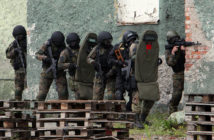 Magharebia
Magharebia
[AFP/Bulent Kilic] The war in Syria is between democracy and dictatorship, not “kufr and faith”, Euro-Mediterranean Centre for Immigration head says.
By Mawassi Lahcen in Casablanca for Magharebia – 03/04/2013
Authorities in the Netherlands raised the country’s terrorism alert level last month, citing concerns over the radicalisation of young people and jihadists traveling to and from Syria.
The news also set off alarm bells in the country’s expatriate Moroccan community, where extremist groups have taken aim at recruiting youths for jihad. Experts fear these newly radicalised Moroccan expatriates could end up exporting salafist ideology back home, threatening Maghreb security.
The National Co-ordinator for Security and Counterterrorism (NCTV) in the Netherlands raised the threat level on March 13th, saying “close to a hundred individuals have recently left the Netherlands for various countries in Africa and the Middle East, especially Syria.”
Many of the jihadists have linked up with Jabhat al-Nusra, which is fighting to establish an Islamic state in Syria after toppling Bashar al-Assad’s regime.
“In conflict zones like Syria, jihadist travellers acquire knowledge and combat experience and can pose a threat to Western interests,” the NCTV said. “These jihadist travellers can return to the Netherlands highly radicalised, traumatised and with a strong desire to commit violence, thus posing a significant threat to this country.”
The report sparked a political debate in the Netherlands, where some called for stripping Dutch citizenship from youths of Moroccan origins who fought in Syria; something that would mean re-exporting the threat to the Maghreb.
“The longer the Syrian war is, the better for jihadist salafists that exploits this war in recruiting young people,” Abdellah Rami, a Moroccan researcher specialising in Islamic groups, told Magharebia.
“The increasing pace of the spread of salafist ideology among the Maghreb community in Europe has become very alarming, not only for the authorities of host countries, but also for the immigrants’ native countries, given that those immigrants form a main channel for the transfer of ideas, money and men,” the researcher said.
Furthermore, an announcement last week that 150 Dutch young people of Moroccan origin were in Syria for jihad and that a number of them were killed in the on-going war has been a shock for Moroccan families in the Netherlands.
Activists rushed to hold a meeting at the Great Mosque in Amsterdam on Sunday (March 24th). The event was attended by associations of Moroccan immigrants in the Netherlands, imams of Dutch mosques, families, as well as seven extremists from the Sharia for Holland group who came to defend their own positions.
The participating imams refuted such positions and invited the extremists to an open fiqh debate about their misconceptions and the wrong fatwas they depend on.
Attendees at the meeting issued a joint statement condemning “radical groups’ exploitation and brainwashing of young people in such a manner that completely contradicts with the principles of Islam which calls for peace among all people”.
“As mosques and associations, we try to sensitise young people, fathers and mothers about these ideas which are imported from overseas,” explained Mohamed Cherouti, the head of Moroccan mosques in the Netherlands and a meeting participant. “We try to warn them that they need to be cautious about calls for jihad and we explain the meaning and rules of jihad in Islam to them.”
“For years now, we’ve been dealing with these calls which target uneducated young people and deceive them to turn them into cannon fodder in wars which they have nothing to do with, whether in Afghanistan, Iraq, Syria or other countries,” he told Magharebia.
In his turn, Abdou Lemnebhi, head of the Euro-Mediterranean Centre for Immigration and Development, said that “authorities must take a firm and decisive stance from these groups to protect our children against them.”
“They exploit the identity crisis which young people face, especially with the growth of racism and Islamophobia and the rise of the extreme right in the Netherlands,” he told Magharebia. “They also exploit young people’s precarious conditions because of unemployment and school dropout.”






